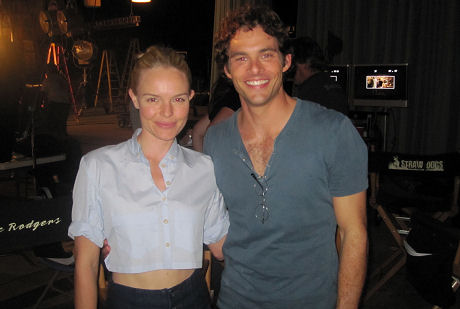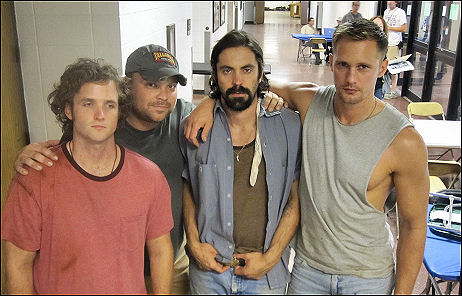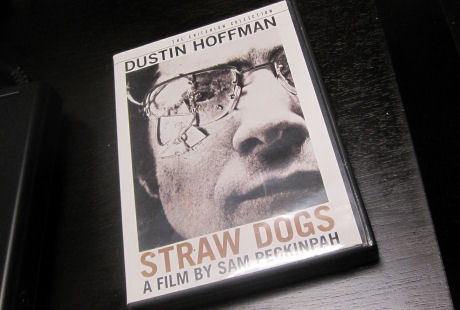Another Roman Polanski pitchforker went after me today (“you need to man up and explain yourself a lot more thoroughly and at length, but you’re ethically deficient and a bad person even if you do”). And I’m just too Shreveport-drained to write yet another re-phrasing of what I’m been saying in fits and spurts for six days now. But Phil Nugent‘s 10.2 article about the RoPo brouhaha solves everything. It says a lot of what I’m feeling right now, and in a slightly more arresting way that I’ve recently managed. (Or so it seems to me now.) So here’s “The Roman Arena” — the best assessment I’ve read so far of the Polanski situation and particularly what drives the haters. Here’s the link, but I’ve pasted almost the whole thing.
“During the last few years when I was writing for Nerve‘s now-defunct film blog The Screengrab — a much-missed golden era in online critical and journalistic commentary that my landlord and I like to call ‘back when I was getting paid for doing this’ — -I spent enough time writing about the decades-long legal travails of Roman Polanski that I felt no compulsion to weigh in on the news that the little Polish sausage had been detained by Swiss authorities and may finally be facing extradition to the United States.
“But since the news broke, I’ll admit to having been surprised by the number of people who’ve latched onto it as a rare opportunity to stand up and bravely declare themselves to be opposed to the rape of children — or, to be specific, to the ‘anal rape’ of children. (Polanski admits to having done more than that to his young victim, but I guess that some people like to boil the charges down to ‘anal rape’ because they think it has a special lyrical ring to it, especially when shouted in one’s best Howard Beale voice.)
“Part of what’s striking about that side of the debate is that, as so often seems to be the case in our current culture of self-righteous apoplexy, a lot of the combatants sound as if they’re really advertising their rage and loathing towards, as well as their superiority to, anyone who disagrees with them, or even sort of agrees with them but with reservations or even in a quiet tone of voice. These people stand accused of being insufficiently opposed to the anal rape of minors, and to drive that point home, their more purple-faced opponents were quick to put together a collection of straw arguments that they could then accuse their foes of having embraced.
“One of these was that anyone less than thrilled with Polanski’s arrest felt sorry for the guy in leg irons, or as they preferred to put it, ‘I’m sure not feeling sorry for a rich celebrity who finally has to face justice for having committed anal rape of a child!’ Suspicions were also hatched that maybe some people think that Polanski should be able to do whatever the hell he wants to our daughters because he’s a highly respected movie director, or, again as the suspicious-minded were more likely to phrase it, ‘I don’t think that having made Chinatown should give somebody a license to run amok!’
“After hearing a few thousand variations on that sentence construction, one might almost begin to wonder if, for some few of those most livid at Polanski, the whole thing was really about them, and about seizing the opportunity to show that they were morally superior not only to the award-winning anal rapist at the center of the story but all those cowards who seemed insufficiently avid for his blood. Of course, I would never suggest such a thing myself. We’re talking about my brothers and sisters in Christ here.
“Cards on the table time: I do not feel sorry for Roman Polanski. He had a hell of a rough time of it coming up, and he also reaped the benefits of the ways in which that shaped him and became one of our most rewarded film artists. He has explored the darkness he knows so well in some lasting works of movie art, and during the very long periods when inspiration seemed to have fled him, he also managed to keep himself in business by exploiting his reputation as a master of darkness in junk like The Ninth Gate. Nor do I think that his talent should be a factor in any legal judgments made against him, though I’ll admit to finding it perturbing that, if this development ends his career, it will have come at a time when he’d unexpectedly started making really good movies again. (At least, I’d take his 2005 Oliver Twist over the 1980 Tess in a hot minute.)
“But for reasons that have nothing to do with Polanski, his life, or his art, I find this last-minute outbreak of law-giving troubling. An article in The New York Times addresses the ways in which Polanski’s celebrity may affect his ability to drum up support from within the ranks of fellow moviemakers (who see him as a colleague and artist) and also inside the Hollywood film industry (which may see him as a guy who hasn’t had a hit in ages). But does anyone think that the law would still be on his tail, for this crime, if the LAPD itself weren’t impressed, and chagrined, by his celebrity? (Questions have also been raised as to whether he’d have even been arrested for the crime if he hadn’t been a big-name movie director, and I think it’s only fair to declare them canceled out by the likelihood that, were he not a big-name movie director, he wouldn’t have been able to persuade an underage girl to meet him in Jack Nicholson‘s hot tub in the first place.)
“For those of us who think there’s something hinky about Polanski’s being detained now, it comes down to, why now? For some thirty years, Polanski’s case seemed to be as low priority as it could get. After fleeing to Europe, he picked up his career and made more movies, none of which were denied release in the U.S., and one of which, The Pianist, won him an Academy Award for Best Director. Journalists and critics continued to write about him, and as the years slipped by, the fact that he was a fugitive from justice inexorably became less and less prominently featured in the stories about him.
“For those of us who think there’s something hinky about Polanski’s being detained now, it comes down to, why now? For some thirty years, Polanski’s case seemed to be as low priority as it could get. After fleeing to Europe, he picked up his career and made more movies, none of which were denied release in the U.S., and one of which, The Pianist, won him an Academy Award for Best Director. Journalists and critics continued to write about him, and as the years slipped by, the fact that he was a fugitive from justice inexorably became less and less prominently featured in the stories about him.
“There didn’t seem to be any noticeable public cry for his capture, the way there was about such vanished or insufficiently punished monsters as Josef Mengele, Byron De La Beckwith or O. J. Simpson. The girl in the case is now in her mid-40s. She maintains that Polanski repeatedly raped her — the statutory rape charge he’s been in flight from was the eventual result of plea bargain negotiations — and also says that she bears him no ill will and would rather he be left alone. A number of gallants have chimed in that her statements about having forgiven Polanski should be ignored, because the poor dizzy thing must be so traumatized by the experience that she can’t think clearly enough to hate Polanski as much as they think she should, but luckily, they’re willing to hate him enough for both themselves and her.
“Despite the evident fact that the Swiss have had numerous occasions to pick up Polanski in the past several years, what with having a house there and all, and despite the law’s having produced a timeline of past attempts to apprehend Polanski over the years — it looks as if a secretary spent at least twenty minutes on it — I find it hard to believe that the recent developments aren’t largely the indirect result of Marina Zenovich‘s 2008 documentary Roman Polanski: Wanted and Desired.
“This is what Alanis Morissette would call ironic, because that movie, which Lauren Bans calls ‘a gross overwrought defense of Polanski’, is implicitly on Roman’s side, sometimes in ways that flirt with the ridiculous. Zenovich tries to leave you with the sense that Polanski had found his soul mate in his starlet wife Sharon Tate and that, after an early life with far too much pain in it, he was on his way to The Big Happy Ending before the Manson family shattered his life, and, on some level, his moral compass.
“It’s not my place to speculate on how plausible I find all that, but I can do Polanski the favor of saying that I doubt that anything that sentimental would ever find a place in one of his movies. The documentary is full of new interviews with Polanski’s friends, who try to sell the viewer on an image of him as a lost, hurting, abandoned child, more sinned against than sinning. In this effort, they are repeatedly undercut by the inclusion of news footage of Polanski himself, who remains (in network TV-speak) one of the most unrelatable public figures of our modern age.
“But once the legal negotiations begin, the movie has an irresistible story to tell it, and it tells it in stereo: much of the second half is narrated by the lawyers involved, including the prosecutor David Wells, and their accounts match. The villain is the late Judge Lawrence J. Rittenband, a publicity addict who was mainly concerned with how the show, excuse me, I mean the trial, was playing out in the media. (The title Wanted and Desired comes from a witness to the circus who notes the striking difference between the European reporters who saw Polanski as an important cultural figure and the American TV crews and journalists, who saw him as a malignant dwarf who had come for our women — and Zenovich makes the point that this view was so strong even at the start of Polanski’s Hollywod career that, in the wake of his wife’s murder, the media often treated the director as if he might be complicit in the killings, or at least as if he had somehow brought it on himself by making sicko movies like Rosemary’s Baby.)
“According to the lawyers, Rittenband actually called them into his chambers and told them what parts he wanted them to play in scenes that he wanted to act out in the courtroom for the media. Ultimately, he agreed, as his little secret with Polanski and the lawyers, to force Polanski to spend a maximum of ninety days in a maximum security prison receiving ‘psychiatric evaluation.’ Again, according to the lawyers, it was understood that this would be Polanski’s sentence, and that after it was over, he’d be given probation. If true, this would mean that Polanski, for all practical purposes, had already served his sentence when he went on the lam, and both the prosecution team and the psychiatric experts were good with it. But after the shrinks decided that Polanski had had enough and he was turned loose after 42 days, the media decided that he wasn’t showing sufficient public remorse, and Rittenband, upset by the bad press, informed the lawyers that he’d changed his mind and was going to throw the book at the little bastard.
“Gunson recalls that, after that mind-blower, Polanski’s lawyer asked him how he could explain this to his client, and Gunson, to his regret, he says, replied that if Polanski were his own client, he might just tell him to hop the next plane out of Rittenband’s magic kingdom.
“Wanted and Desired, which won an award at the Sundance Film Festival, played on HBO, and had a modest theatrical run, re-ignited interest in the case, so much so that, as the year was drawing to a close, Polanski’s lawyers made a motion to have the case against him dropped. They were quickly followed by an effort by the woman Polanski raped to drop the charges, saying that the lingering ‘attention’ the case still generated “is not pleasant to experience and is not worth maintaining over some irrelevant legal nicety, the continuation of the case.” (There were also rumors, based on material deleted from the film, that a new judge on the case offered to drop the whole thing if Polanski would only agree to have the hearings televised.) The let’s-drop-this-thing movement ultimately foundered because Polanski refused to return to the U.S. He didn’t trust the District Attorney’s office, and in light of recent events, he may have had the right idea.
“Based on how the case that had laid dormant for so long — especially during those years when Polanski, the director of Pirates and Frantic, was ice-cold as a celebrity name in Los Angeles — suddenly became of pressing importance in the wake of the doc and all the attendant stories about how justice in L.A. isn’t even what it’s cracked up to be, despite the fact that it’s already seen as pretty damn cracked, it’s hard for even a conspiracy-phobe like myself not to conclude that what made this case an A-list priority after all this time is that Roman Polanski’s real crime is that he ran away, thrived, and in the process made the law look ridiculous.
“And then, having done all that, he even had the audacity to feel them out about getting his name cleared so that he could visit their fine city again and, after they tried to save face by imposing some restrictions of their own, like asking him to actually show up in a courtroom, walked away again, saying, no — my life’s good, it’s not really that important to me.
“Now David Wells has declared that he was flat-out lying in the documentary, and his explanation for this ought to be enshrined in the Weasel Words Hall of Fame: he says that he thought it would be okay to tell these lies (and slander the dead judge) for the sake of ‘a better story’ because he didn’t think anyone would see the movie. (He also says that he didn’t think that it would be a big deal because nobody cared about the case anymore, which would seem to give the lie to the claims by the D.A.’s office that they’ve been sweating over it like Inspector Javert since 1977.) The [Daily Beast] article that broke this story — it’s by “Marcia Clark“, who is either a different person than the TV prosecutor of that name who starred in the O. J. Simpson miniseries of fourteen years ago or is that person after receiving a head transplant — seems to think that Wells’s claim to be an untrustworthy lying motherfucker are a great thing for the state’s case, and adds that ‘If you want to know what it’s all about, read Samantha Geimer‘s testimony before the grand jury. See what you think.’
“Actually, deciding that the testimony that Polanski’s victim gave 32 years ago is more important, in deciding what to do about it now, than taking into consideration her adult pleas that the case go away has nothing to do with what anyone thinks. It’s about what people feel. There’s no softer place in most people than the thought of raping a child, and when you throw in ‘rich and famous’, ‘sinister foreigner’, ‘Hollywood pals’ and all the other buzzwords that adhere to Polanski, you have a handy smokescreen that’s guaranteed to short-circuit any debate about whether you really want a considerable amount of the law’s limited resources devoted to hauling in a 75-year-old man on a thirty-two-year-old warrant, ostensibly because of something he did to someone who says she doesn’t want to see him prosecuted, but really (and, I think, obviously) because the law doesn’t like to be humiliated by someone it sees as an unrepentant show business sleazeball.
“Polanski may be a sleazeball, but nobody thinks he’s a menace to society — one big difference between then and now is that nobody working for his prosecution can seriously think they’re working to prevent him from doing this again — so the spectacle of his detainment and possible future prosecution can only appeal to that lizard part of the brain that thinks that the justice system has nothing to do with protecting society and everything to do with punishing those we disapprove of. This isn’t, or shouldn’t be, about how much of your pity you want to lavish on monsters. It’s about whether, in a country with the largest and most overcrowded prison system in the world, we want to apply any practical considerations at all to who goes and stays into a cell or if we just want to use the system to luxuriate in our capacity for blood lust.
“I don’t think that people would support this kind of use of their tax dollars and the police’s time if Polanski had robbed a bank or maybe even if he’d killed somebody, but throw in ‘anal rape’ of a child, and many people would probably all for seeing him torn apart by hungry bears in the Thunderdome on live TV. I’m not sorry for Polanski. I don’t think his talent gives him license to rape children. I don’t even, I swear to God, support the rape of children by anyone. But the Los Angeles County Justice Department is performing an expensive, international operation that I doubt it would like to try to justify on the grounds of protecting and serving the public, and all because it got its shins kicked.
“They feel that they can get away with what they want to do because there are certain crimes that set off such a light show inside the skulls of most people that, if they’re told what they’re seeing is in reaction to one of those crimes, they’ll forgive the law anything. So did John Yoo.”






